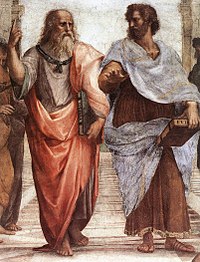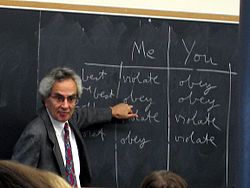Wikimedia Ethics

Welcome
[edit | edit source]Please make sure you have reviewed the page What is Wikiversity? before you participate and contribute to this project.
What are ethics?
[edit | edit source]Ethics are moral standards of conduct agreed upon to define right and wrong. That which is ethical is considered morally correct. That which is unethical is considered morally wrong. Ethics are usually considered in a professional code of conduct as a qualified professional is under more expection than an unqualified individual to have a learned understanding of the accepted principles of right and wrong.
Learning ethics in online media
[edit | edit source]| Perspective: . Its authors are committed to maintaining a high level of scholarly ethics. |
Principles of ethics in online media is the scope for this resource; however, this resource draws upon comparisons that center on the English Wikipedia, which has over a quarter-million biographies of living persons (BLPs) as well as many articles that characterize people, organizations, events, and other aspects of human activity. The degree to which the content and practices of Wikimedia projects adhere to commonly recognized principles of ethics, which include such comparisons of Wikipedia, are what this resource examines.
Temporary guideline: This project currently does not accept case studies of living people until further notice.
List of subpages
[edit | edit source]- All subpages: special:prefixindex/Wikimedia Ethics/
- All talk subpages: special:prefixindex/Talk:Wikimedia Ethics/
- All recently edited pages: Dynamic page list
Resource Management
[edit | edit source]- Audio
- Brainstorming
- Participants and objectives
- Project Timetable
- User:Privatemusings/EthicsSandbox - a personal sandbox space in which all are welcome to try and help energise this project.
Learning resources
[edit | edit source]
- Change BLP policy
- Ethical Code for Wikipedians
- Ethics on Wikipedia and the Internet
- Fundamentals of ethics
- List of questions
- Response Testing on WMF projects
- Social contract
- Paid editing and Wikipedia Zero
- Suggested essays
How to improve this resource
[edit | edit source]
- Identify principles for objective evaluation
- Evaluate Wikimedia systems
- Identify what needs to be learned by the community
- Create or update collaborative research pages and workshops
See also
[edit | edit source]- How to be a Wikimedia sysop
- Wikimedia Studies Portal
- Wikipedia learning resources
- Wikiversity:Editing Applied ethics
External links
[edit | edit source]- Wikidashboard – facilitates analysis of relative contributors to Wikipedia articles by specific authors
